 |
|||
|
Fall 2016 A Word From the Director
Our community continues to grow and excel, and happily, I have a lot to report from the past year. This year our PhD graduates included Dr. Giada Arney (Astronomy & Astrobiology), who won a NASA Postdoctoral Fellowship at the Goddard Space Flight Center, Dr. Eddie Schwieterman (Astronomy & Astrobiology) who won a NASA Astrobiology Institute Postdoctoral Fellowship at UC – Riverside, and Dr. Jaci Saunders (Oceanography & Astrobiology) who is now a postdoc at the University of Washington. Coming up, graduate student Elena Amador (Earth and Space Sciences and Astrobiology) will defend her dissertation in February 2017, and then take up a postdoctoral position at Caltech. I also want to highlight and send my congratulations to the Astrobiology class of 2013-2014, four of whom were snapped up for tenure-track faculty positions this year! Dr. Rika Anderson (Oceanography and Astrobiology) is now an Assistant Professor at Carleton College. Dr. Aomawa Shields (Astronomy and Astrobiology) is an Assistant Professor at UC – Irvine (and also won the Origins Lectureship at ASU). Dr. Jeff Bowman (Oceanography and Astrobiology) is an Assistant Professor at Scripps Oceanographic Institute, and Dr. Eva Stüeken is just about to take up a Lectureship at the University of St. Andrews, in Scotland. We welcome a large incoming class of 8 new students this year. They are Tyler Gordon and Hayden Smotherman in Astronomy, Erik Goosman, Jana Meixnerova, Lauren O’Neil and Addien Wray in Earth and Space Sciences, and Zac Cooper and Hannah Dawson in Oceanography. We also welcome new Astrobiology Faculty member Prof. Jodi Young who joined the Astrobiology Program after starting as an Assistant Professor in the UW Oceanography Department. Jodi comes to us via Oxford and Princeton, and has research interests that include the evolution of photosynthesis in phytoplankton, and polar marine research. Astrobiology faculty member Prof. Rory Barnes - who works on orbital dynamical and other effects on planetary habitability - was promoted from research professor to tenure-track Assistant Professor in Astronomy. Congratulations to both Jodi and Rory on their new positions! Events 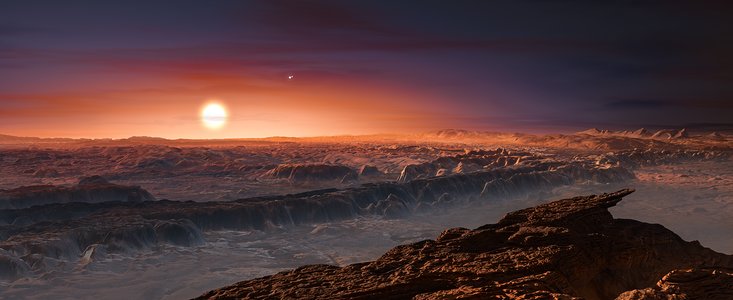
Artist's impression of Proxima Centauri b from ESO/M. Kornmesser
We are thrilled to host Dr. Guillem Anglada-Escudé in May 2017! Dr. Anglada-Escudé led the team that discovered Proxima Centauri b, a possibly rocky planet in the habitable zone of the nearest start to our Sun. Dr. Anglada-Escudé will give a public talk on his team's discovery on May 3rd in Kane Hall 120 at 7 pm. UW Astrobiology Spring Colloquium Our Fall 2016 Colloquium was a great success and we are now inviting speakers for our next colloquium in Spring 2017. Now is the time to let us know if there is a speaker you have been wanting to meet or know of an astrobiologist doing interesting work that you would like to see in the Spring! UW Bookstore Speaker: David Grinspoon Astrobiologist David Grinspoon will be giving a talk at the UW Bookstore in the UDistrict on January 10 at 7 pm. Dr. Grinspoon assesses climate change by comparing the Earth’s story to those of other planets. Without minimizing the challenges of the next century, Grinspoon suggests that our present moment is not only one of peril, but also great potential, especially when viewed from a 10,000-year perspective. Alumni Spotlight: Dr. Nick Cowan Alumni Spotlight: Dr. Rika Anderson Where in the World Are Our Astrobiologists? 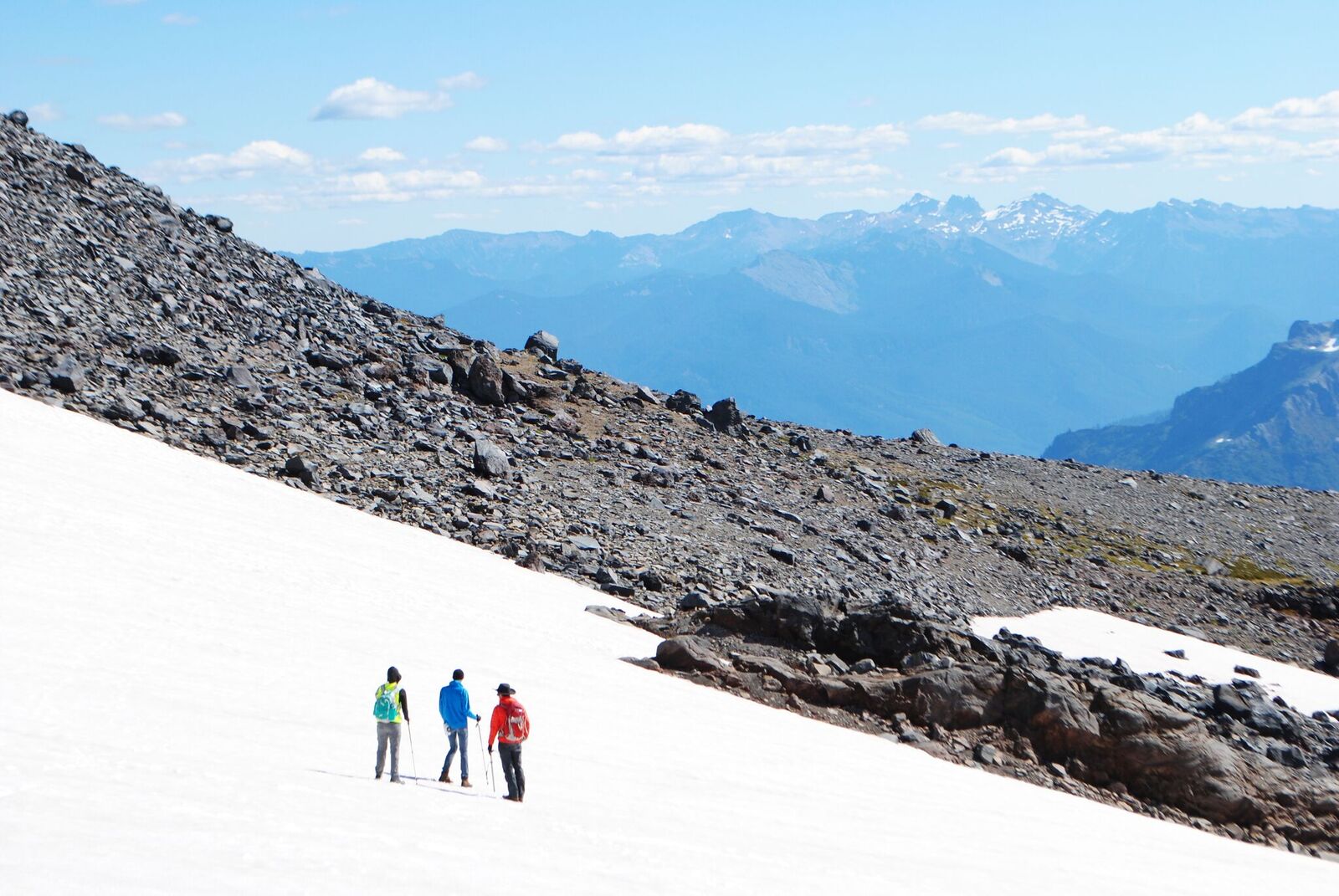
Photograph by Jacob Lustig-Yaeger, 2016 The UWAB Program encourages, supports, and in many cases, organizes educational experiences for astrobiology students in our program and around the world. Read on to discover the places we visited this past year! Dust Storms in East Asia: A Research Rotation Report Isotope Analysis with Thiobacillus Denitrificans: A Research Rotation Report |
Give a Gift
UWAB @ A Glance
Science Highlights
Congratulations!
| ||
| |||
 With the discovery of Proxima Centauri b, a possibly terrestrial planet orbiting in the habitable zone of the nearest star to the Sun, the search for life beyond the Solar System has come even closer to home! The University of Washington’s Astrobiology Program is at the forefront of exciting new efforts to look for life beyond the Earth, and to train the next generation of interdisciplinary explorers. Our community works to push new frontiers of knowledge of our place in the Universe that cannot be fully explored by a single researcher or a single discipline.
With the discovery of Proxima Centauri b, a possibly terrestrial planet orbiting in the habitable zone of the nearest star to the Sun, the search for life beyond the Solar System has come even closer to home! The University of Washington’s Astrobiology Program is at the forefront of exciting new efforts to look for life beyond the Earth, and to train the next generation of interdisciplinary explorers. Our community works to push new frontiers of knowledge of our place in the Universe that cannot be fully explored by a single researcher or a single discipline.
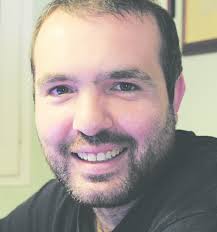 Distinguished Lecture Series: Guillem Anglada-Escudé
Distinguished Lecture Series: Guillem Anglada-Escudé UWAB former grad student Dr. Nick Cowan (Astronomy & Astrobiology, 2009) conducts research on exoplanets at McGill University, where he is an Assistant Professor in the Physics and Earth & Planetary Sciences departments teaching Astrobiology courses.
UWAB former grad student Dr. Nick Cowan (Astronomy & Astrobiology, 2009) conducts research on exoplanets at McGill University, where he is an Assistant Professor in the Physics and Earth & Planetary Sciences departments teaching Astrobiology courses.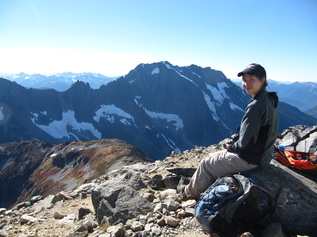 UWAB former grad student Dr. Rika Anderson (Oceanography & Astrobiology, 2013) works arduously for better opportunities for minority and underprivileged high school students in Tucson, AZ. She will start her appointment as a tenure-track Assistant Professor at Carleton College in January 2017. At UW, she conducted research on viruses in deep-sea hydrothermal vents.
UWAB former grad student Dr. Rika Anderson (Oceanography & Astrobiology, 2013) works arduously for better opportunities for minority and underprivileged high school students in Tucson, AZ. She will start her appointment as a tenure-track Assistant Professor at Carleton College in January 2017. At UW, she conducted research on viruses in deep-sea hydrothermal vents.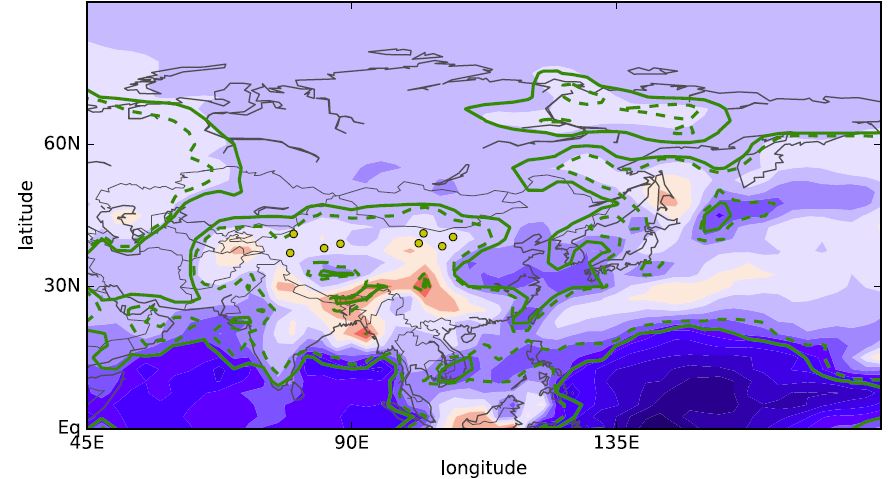 Astronomy student Russell Deitrick teamed up with Professor Cecilia Bitz in UW's Atmospheric Sciences department. Recent work by Wang et al. (2008) found that the occurrence of dust events in the Taklamakan and Gobi deserts of East Asia were correlated with increased global surface temperatures, so Deitrick re-analyzed wind data to confirm and expand on those results. Specifically, he looked for correlations with surface temperature, soil moisture, wind speeds, and arctic sea ice. As polar temperatures increase more rapidly than tropical temperature, we would expect that dust events would become less common.
Astronomy student Russell Deitrick teamed up with Professor Cecilia Bitz in UW's Atmospheric Sciences department. Recent work by Wang et al. (2008) found that the occurrence of dust events in the Taklamakan and Gobi deserts of East Asia were correlated with increased global surface temperatures, so Deitrick re-analyzed wind data to confirm and expand on those results. Specifically, he looked for correlations with surface temperature, soil moisture, wind speeds, and arctic sea ice. As polar temperatures increase more rapidly than tropical temperature, we would expect that dust events would become less common.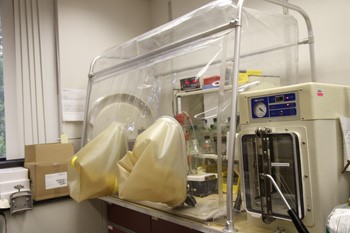 ESS student Matthew Koehler went to St. Andrews, Scotland to work with Dr. Aubrey Zerkle and VPL researcher Dr. Mark Claire (also UWAB alum). He grew a species of bacteria, Thiobacillus Denitrificans (TD), which uses oxidized nitrogen-containing molecules such as nitrate and nitrite to oxidize reduced sulfur species. Both nitrogen and sulfur isotopes are used in the geologic record to interpret past microbial ecology and environmental conditions, so the isotopic ratios of both nitrogen and sulfur can be used to interpret the history of biological activity in the geological record.
ESS student Matthew Koehler went to St. Andrews, Scotland to work with Dr. Aubrey Zerkle and VPL researcher Dr. Mark Claire (also UWAB alum). He grew a species of bacteria, Thiobacillus Denitrificans (TD), which uses oxidized nitrogen-containing molecules such as nitrate and nitrite to oxidize reduced sulfur species. Both nitrogen and sulfur isotopes are used in the geologic record to interpret past microbial ecology and environmental conditions, so the isotopic ratios of both nitrogen and sulfur can be used to interpret the history of biological activity in the geological record.